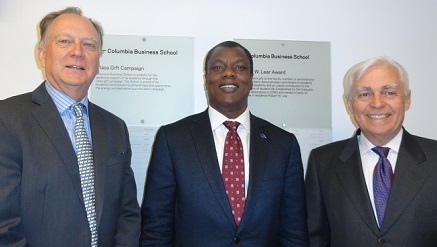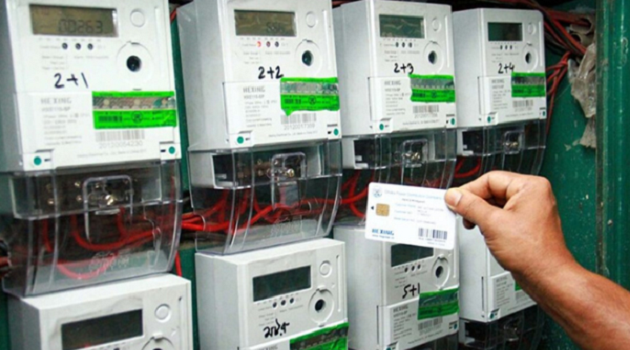General News
CWG Boss Commends Nigeria’s Business Competitiveness at CBS

Austin Okere, founder, CWG Plc and Entrepreneur in Residence at Columbia Business School, thumbed up Nigeria’s business competitiveness at the CBS annual Entrepreneurs in Residence Week in New York during the last week of October.
Addressing the group of graduate students in the Private Equity and Entrepreneurship in Africa Course with Professor Murray Low of the Eugene Lang Entrepreneurship Centre,
Okere highlighted Nigeria as one of the top three investor destinations in Africa.
Quoting figures from the United Nations Conference on Trade and Development (UNCTAD), he reiterated that of the $57b Foreign Direct Investment (FDI) that Africa attracted last year, Nigeria saw the lion share of about $5.6b, which is very significant given that only six other countries attracted investments above $3b.
This is coming on the heels of Nigeria moving up five places in the latest release of the World Bank Doing Business Report.
This is well above the average improvement of two positions by the MINT countries (comprising Mexico, Indonesia, Nigeria and Turkey).
More importantly, the “Starting a Business” and “Getting Credit” pillars saw the most significant changes, moving up nine and 73 places respectively, indicating better engagement with the Small and Medium Enterprises (SMEs) sector, which tends to be the engine of growth in most developing economies.
Advising the audience to explore other viable geographies, Okere reiterated his view expressed at the World Economic Forum Meeting of the Global Champions in Tianjin, China, that the new frontiers for business expansion following saturation in the developed markets were Africa and Latin America. He however cautioned against wholesale importation of western business model templates into these emerging markets given the different geographies, peoples and cultures.
He counselled local partnerships to explore the immense opportunities in a mutually beneficial manner.
In Okere’s view, significant milestones have been achieved in important areas such as pervasive broadband access, making it possible to pursue hitherto impossible business models in Cloud Computing and eCommerce.
He also enumerated the giant strides in Power Sector reforms, Agriculture and SME support and financial inclusion through the Central bank’s Cashless Initiative, leading to improved financial transparency; and the adoption of the IFRS Accounting standard leading to greater corporate governance standards.
According to Okere ‘the recent admission of the Nigerian Stock Exchange into the World Federation of Exchanges is testimony to the huge success of the Capital Market reforms, and serves as a positive barometer for investors’ appetite’.
Qualifying his optimism, Okere had this to say “being a member of the World Economic Forum’s Business Council and a board member of the National Competitiveness Council of Nigeria, it is not lost on me that there is still a lot to be done for Nigeria to achieve her full potential, as has been highlighted by the recent WEF Competiveness Index report. I however, believe that it is not far-fetched for Nigeria to aspire to become one of the 20 largest global economies by 2020 starting from a comfortable base of being the largest economy in Africa and the 26th largest global economy”.
To achieve this however, he advocates the acceleration of investments in critical infrastructure and also getting the Local Governments to step up in their responsibility towards the provision of Primary Health Care and Primary Education.
Columbia University’s Entrepreneur in Residence Program brings together selected individuals of exceptional talent and a history of accomplishment to assist tomorrow’s business leaders by providing valuable insights garnered from their extensive experience.
Commenting on Okere’s contribution, Mr. Cliff Schorer, Program Director, had this to say “Austin has provided the program with a broad foundation of knowledge, and he serves as a resource to those interested in developing enterprises in emerging markets. With the landscape of global business rapidly expanding, Austin’s availability to students, faculty and administrators has proven to be extraordinary, and his openness, presentation skills and willingness to assist others is a great asset to the program”.
Similarly Professor Murray Low, founder of the Columbia Entrepreneurship Program remarks as follows
“Our EIR program seeks to attract successful entrepreneurs with deep sector experience. With Austin, we get two for one; deep experience in information technology as well as emerging markets. His unique insights are hugely valued.”
An elated Okere, whose company has been used as case studies in both CBS and MIT responded by stating how touched he was by the kind words of the Program Directors.
He philosophically declares “I am happy that the work I do at CBS and the achievements of my company put Nigeria firmly on the map in the global academic community. I am pleased to be a worthy ambassador, making Africa proud”.
General News
AfDB Approves €6.5m for Tech Startups

African Development Bank Group (AfDB) has approved a €6.5 million investment in the Saviu II venture capital fund to boost technology start-ups across Francophone West and Central Africa.

The Bank Group will contribute €4.5 million as equity investment and an additional €2 million as a first-loss hedging tranche on behalf of the European Commission under the Boost Africa Programme.
The investment is expected to strengthen early-stage financing for innovative businesses with strong technological and digital components, particularly in French-speaking countries.
Saviu II, the second investment vehicle managed by Saviu Partners, plans to invest between €500,000 and €3 million in about 20 seed-stage or early institutional fundraising start-ups. The fund will primarily target B2B technology-oriented companies with scalable models.
At least 60 per cent of the fund’s commitments will focus on French-speaking countries in West and Central Africa, including Côte d’Ivoire, Cameroon, Benin, Senegal, Togo, Burkina Faso and Mali.
The fund may also co-invest in promising East African technology firms seeking expansion into Francophone markets.
In addition, Saviu II will dedicate a special funding envelope for pre-seed investments, mainly through minority equity stakes, often in collaboration with incubators, venture studios and other ecosystem partners.
Industry observers say the AfDB’s backing is expected to de-risk early-stage investment and crowd in more private capital into Africa’s growing digital economy.
Saviu Partners previously launched Saviu I in 2018 with a capitalization of €10 million.
The first fund invested in 12 start-ups, mainly based in French-speaking West Africa, offering not just funding but hands-on support in business development, recruitment, international expansion and fundraising.
General News
NERC Orders DisCos to Refund ₦20.33Bn Meter Costs to Customers

Nigerian Electricity Regulatory Commission (NERC) has ruled in favor of electricity consumers, directing distribution companies (DisCos) to refund ₦20.33 billion in outstanding costs for meters bought under the Meter Asset Provider (MAP) framework.

NERC
Signed on February 27, 2026, by Musiliu Oseni, chairman,NERC and Dafe Akpeneye, commissioner Order No. NERC/2026/025 amends a 2023 directive.
It requires DisCos to disburse the funds via energy credits over 12 months starting March 1, 2026, addressing years of slow refunds.
As of December 31, 2025, DisCos owed this amount due to delays in reimbursing prepaid customers who funded their own meters.
DisCos must automate credits for the full MAP meter cost upon activation, disbursed monthly over 120 months based on the customer’s tariff—credits cannot offset legacy debts.
Prepaid customers will receive a monthly token by the 4th day equivalent to the reimbursement value; for arrears, they’ll get two tokens per month.
Postpaid customers will see a distinct credit line on bills subtracted from totals, with two line items monthly for arrears.
NERC mandates monthly reports on reimbursement values using an approved template, plus dedicated email channels for complaints with resolution status included.
The order aims to end delays, improve notifications, and boost sector trust. DisCos must accelerate arrears recovery over 12 months without further excuses.
This follows NERC’s February 2026 compliance review, amid ongoing power sector challenges highlighted by Power Minister Adebayo Adelabu.
General News
NCDC Raises Alarm over Lassa Fever Ravaging 18 States in Nigeria

Nigeria Centre for Disease Control and Prevention (NCDC) has raised alarm over ravage of Lassa fever cases across 18 states and 67 Local Government Areas (LGAs) of the country.

Dr Jide Idris, director-general of NCDC, in statement yesterday, said that Bauchi, Ondo, Taraba, Edo and Benue accounted for more than 80 per cent of confirmed cases recorded during the 2026 peak transmission season.
Idris, described as particularly worrisome the growing infections among healthcare workers, with 28 confirmed cases and three deaths reported so far this season.
NCDC attributed the sustained transmission and rising fatalities to operational gaps at the state level, urging urgent action to strengthen outbreak response and control measures.
According to Idris, field investigations showed most transmissions were occurring in known endemic areas, but weak implementation of established response frameworks had contributed to the continued spread and higher case fatality rate.
He said that gaps identified include infections in general outpatient and maternity settings, poor adherence to Infection Prevention and Control (IPC) protocols, and inadequate pre-positioning of Personal Protective Equipment (PPE).
He added that delayed patient presentation due to financial barriers, inconsistent activation of State Incident Management Systems, weak contact tracing, persistent stigma and poor isolation centre standards were also driving transmission.
Idris emphasised that outbreak response implementation and health service delivery fell primarily under state governments within Nigeria’s federal structure, urging them to strengthen accountability and resource allocation.
He called on affected and high-risk states to urgently activate and closely monitor their Incident Management Systems, ensuring timely coordination and efficient outbreak response at all levels of healthcare delivery.
He also urged the immediate release of response funds, strict enforcement of Infection Prevention and Control (IPC) compliance in public and private health facilities, and continuous availability of PPE and other critical supplies.
The NCDC boss also advocated accelerated financial protection mechanisms to reduce late presentation and high fatality rates, alongside institutionalised rodent control and environmental sanitation measures under a One Health approach.
He advised healthcare workers to maintain a high index of suspicion and adhere strictly to IPC guidelines.
He also urged the public to keep environments clean, prevent rodent entry into homes, store food safely and seek early medical care when symptoms appeared.
Idris noted that Lassa fever was treatable, with improved outcomes when detected early, adding that Nigeria was also responding to other epidemic-prone diseases including Cerebrospinal Meningitis, Diphtheria, Mpox and Cholera.
He reiterated NCDC’s toll-free emergency line, 6232, for reporting suspected cases and obtaining further information

 Telecom3 days ago
Telecom3 days agoSunil Bharti Mittal Conferred GSMA Lifetime Achievement Award for Transforming Global Telecommunications

 Telecom3 days ago
Telecom3 days agoWhy Digital Trust Matters: Secure, Responsible AI for African SMEs?

 E-Business3 days ago
E-Business3 days agoJumia Tech Week 2026 Begins with Tech Deals on Smartphones, Electronics, and Everyday Technology

 General News3 days ago
General News3 days agoKrishnan Exits Africa Data Centre to Embark on Professional Chapter

 E-Financial2 days ago
E-Financial2 days agoNRS Targets N40trillion in Tax, Royalty Revenue in 2026

 Telecom3 days ago
Telecom3 days agoHouse Probes Fintech Regulation via Public Hearing on New Commission Bill

 News3 days ago
News3 days agoAfDB Supports Francophone Africa Start-ups with €6.5M

 E-Financial2 days ago
E-Financial2 days agoSEC Revokes Registration of Kensington Agro Trading Limited
























